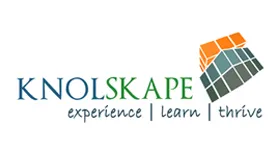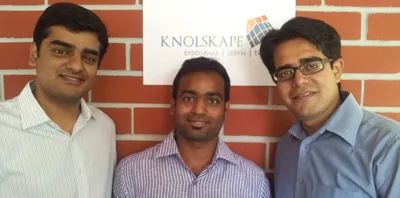Experiential Learning Solutions with KNOLSKAPE

Rajiv Jayaraman, with a sparkling academic background, an undergrad degree from BITS Pilani, Masters in Computer Science from the US and an MBA from INSEAD, started KNOLSKAPE in 2008. Before going to INSEAD, the place where he found the push to start up KNOLSKAPE, Rajiv Jayaraman had an experience of 6 years working with Oracle. KNOLSKAPE thrives to provide the best solutions to managers, students, academicians and recruiters through experiential learning. Yourstory.in caught up with Rajiv Jayaraman to know more about KNOLSKAPE. Excerpts from the interview:What led to the creation of KNOLSKAPE?
KNOLSKAPE was started in 2008. When I joined INSEAD, I wanted to startup something in the space where technology and creativity would intersect. I had a background in theater and film-making, so my week days while at Oracle were all about cranking code, and weekends were all about being creative and doing on-stage theater.
At INSEAD, I came across a simulation based change management program; and that was an eye-opener for me. It was a technology based product around story telling, the simulation had a scenario and you had to play a role in it, and I thought that was a brilliant way to teach. That experience was the genesis of KNOLSKAPE.
We started up in Singapore, and Singapore being a great startup friendly city, we got set up in a day. I had Vijay Kalangi with me who is the Chief Products Officer at Knolskape, and we were a two member team sitting out of INSEAD for the first year. We worked very closely with INSEAD, we worked on simulations and multi-media case studies focussing mainly on management training in the first year. In year two, we moved out of INSEAD, and we also had our first employee here in India. Then we started working for other B-schools such as Kellogg, ISB and S P Jain. Early last year, we also entered the assessments arena, and the state-of-art today in assessments is that, if you want to judge someone’s managerial capabilities then you have to do it via multiple choice questions, but we feel that simulations are a better way to assess a person’s skill set. Broadly, we are now into training, assessments and business research.
Was it challenging to start up immediately after B-school?
It was tough, INSEAD was not a very economical program, and I had a student loan to pay off. But, I decided not to run behind things that I don’t want to do in life. I told myself that I would treat this as a two year MBA (with one year project), if things did not work out. That is how I framed the situation for myself and took the plunge.
How did you go about acquiring your first few customers after INSEAD?
We were lucky on that front! INSEAD being one of the Top 10 B-schools, it was relatively easier for us to acquire the next few customers. We were INSEAD’s academic computing partner which means INSEAD’s most academic computing projects were done by us. That was a great start for us, and after we have proved ourselves at INSEAD it was easier for us to convince the other B-schools to use our simulations.
Can you tell us a bit more about the features of the product itself?
For most academic institutions, we have off-the-shelf products. Most corporates however have very specific needs, off-the-shelf products do not work, in such cases we customize the products for them. The beauty of our products is that, they can be customized very easily in two to three days.

For academic institutions, we have at least one simulation product for each of the major management courses starting from accounting to supply chain to marketing to finance to IT. We tried to cover as many management domains as possible through our simulations, in addition to that we are also developing general management simulations that cover parts of all the courses. Our philosophy is that learning should be through doing. One way teaching is not going to work anymore, as the attention span of students and managers is going down. Clearly, there is a need to offer something that would engage the participants, let them participate and not just be passive. What is different about our simulations is that is they are very experiential.How many customers do you have?
At this point, we have 15 customers. Out of which, 5 are corporate clients and the rest are academic institutions. One of our clients, MeritTrac uses our products for their pre-recruitment assessments. We have done pilots with companies like Wipro and Cognizant wherein these companies are hiring big time from B-schools, and they need a way to filter candidates very effectively, however, the state-of-art so far is multiple choice and we are trying to replace that with something more sophisticated and more real world like.
How big is your team now?
We are 17 member strong now.
Are you hiring?
Yes, we are looking to hire folks for marketing as well as technical roles.
As a startup, how did you overcome the challenges of hiring right people for your team?
During the interview process, it is made very clear to people that they have to wear multiple hats. And, most of the times one is expected to give their 120 percent to the product. Luckily for us, KNOLSKAPE is a very fun environment; we are developing games at the end of the day, and being aware of the impact that the games we develop create on learners is helpful.
Are you looking to fundraise?
Yes, this year.
When did you break even?
Luckily, we broke even in the first year of operations itself, as we were doing a lot of services for INSEAD and Kellogg School of Management. We funded our products through our services.
How is the product priced?
The product pricing differs on whether it is for corporates or for B-schools. For example, we have a product for B2B marketing simulations; a great product for marketers to learn though experiences; priced at 1,250 euros per use for a class size of 25.
Can you please share your expansion plans with us?
We are looking at geographical expansion, we are currently in talks with many Universities outside of India, especially Australia, Middle East and the US. We see the need for our product globally. Assessments is a big market, and we have barely scratched the surface. Also, apart from the management courses, we would soon look at the intersection of engineering and management. We would love to venture into vocational training space as well.
Three trends that you see in Education today.
Very soon traditional, physical text books will be out. Two way engagement in learning will be a big trend. Social learning is going to be big.
Do visit http://knolskape.com for further details







